Catégories
|
Thésaurus IAMM > ECONOMIE > ECONOMIE AGRICOLE > SYSTEME DE PRODUCTION > AGRICULTURE BIOLOGIQUE
AGRICULTURE BIOLOGIQUEVoir aussi |
Documents disponibles dans cette catégorie (562)
 Ajouter le résultat dans votre panier Affiner la recherche
Ajouter le résultat dans votre panier Affiner la recherche
Article
R.L. Pânzaru ; R.L. Pânzaru ; D. Firoiu ; G.H. Ionescu ; A. Ciobanu ; D.M. Medelete ; R. Pîrvu |Organic agriculture is considered an important component of sustainable development because it promotes environmental sustainability and social responsibility, involving the use of practices that minimize the negative impact of agriculture on th[...]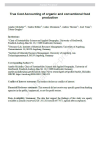
Article
A. Michalke ; S. Köhler ; L. Messmann ; A. Thorenz ; A. Tuma ; T. Gaugler |Agriculture is one of the world's biggest polluters. Consumers are misled towards demand of unsustainable and inadequately priced food products by an insufficient internalization of externalities. Shifting demand towards more sustainable dietary[...]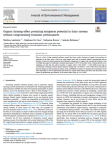
Article
M. Lambotte ; S. De Cara ; C. Brocas ; V. Bellassen |There is a lack of clear empirical evidence towards the lower carbon footprint of organic food products, in particular in the dairy sector. Until now, small sample sizes, lack of properly defined counterfactual and the omission of land-use relat[...]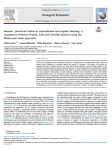
Article
G. Leduc ; L. Billaudet ; E. Engström ; H. Hansson ; M. Ryan |Values act as driving forces for individuals to behave in a certain way or to choose certain actions. They may explain current differences of converted organic land among EU countries. In this paper, we identified and compared the types of value[...]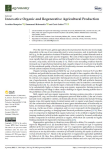
Article
Over the last 50 years, global agricultural food production has become increasingly dependent on the use of non-renewable and/or scarce resources, and, in particular, fossil fuel (e [...]
Article
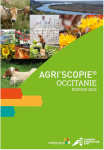
Série
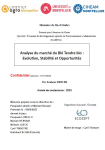
Thèse, Mémoire, Master
Ce travail vise à caractériser l’évolution du marché du blé tendre biologique (production, utilisation, échanges) dans un contexte en mouvement (Covid, changement climatique, fraudes) dans l’Union Européenne avec un éclairage sur la situation et[...]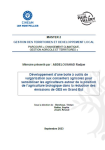
Thèse, Mémoire, Master
Le conseil agricole fait référence aux échanges entre les agriculteurs et les conseillers agricoles sur l’itinéraire technique de la production, la gestion des données des exploitations agricoles et l’amélioration des performances techniques de [...]
E-Book
This book will collate, review and synthesize information on how Organic Agriculture (OA) practices affect and are affected by climate change, in comparison to the more widely used conventional agricultural practices. Pros and cons of OA practic[...]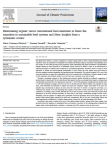
Article
The global food system is a major contributor to climate change with 23–42% of total greenhouse gas (GHG) emissions. Thus, the transition to sustainable food systems and dietary patterns represents a big challenge and a key solution to feed a fa[...]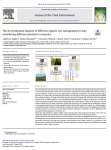
Article
V. Vaglia ; J. Bacenetti ; F. Orlando ; S. Alali ; E. Bosso ; S. Bocchi |Rice cultivation has a key role in food security worldwide; on the other hand, it has a high potential impact on the environment and human health, mainly due to the extensive pesticides use and greenhouse gas emissions caused by flooded cultivat[...]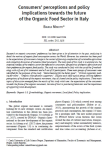
Article
Research on organic consumers’ preferences has been given a lot of attention in the past, analysing in detail the motives of organic food consumption across the World. Less attention has been paid to the expectations of consumers change in the c[...]
Article
C. Franceschinis ; R Scarpa ; L. Rossetto ; M. Thiene |We investigate consumers’ preferences towards local and organic food via a framed field experiment involving revealed multiple discrete–continuous choices. Participants were endowed with a cash amount as a budget to purchase any desired quantity[...]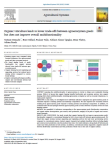
Article
N. Ostandie ; B. Giffard ; P. Tolle ; A.A. Ugaglia ; D. Thiéry ; A. Rusch |CONTEXT Assessing the multifunctionality of agroecosystems is crucial to design more sustainable farming systems. While it is known that organic farming benefits biodiversity and ecosystem services, how organic farming affects their multifunctio[...]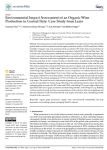
Article
G. Vinci ; S.A. Prencipe ; A. Abbafati ; M. Filippi |Growing awareness of environmental sustainability in the agri-food sector has enhanced the gradual shift toward less-impactful food and organic production systems. In 2021, nearly three million hectolitres of organic wine were produced which acc[...]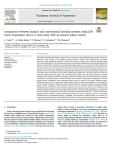
Article
L. Verdi ; A. Dalla Marta ; F. Falconi ; S. Orlandini ; M. Mancini |Assessing the environmental impact of agriculture is a key factor towards reducing human impacts on the food production chain. Because of the growing consumer interest in healthy foods cultivated with low-impact approach, a study assessing the i[...]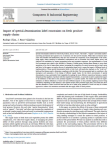
Article
Special Denomination labels for fresh food products, such as 'local', 'fair-trade', 'organic' and similar market-narrowing movements have gained a lot of attention over the last few decades. While these movements have some clear benefits and ben[...]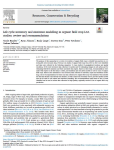
Article
N. Bamber ; R. Johnson ; E. Laage ; G. Dias ; P. Tyedmers ; N. Pelletier |The purpose of this manuscript is to review LCA studies of organic field crops to identify best practices in collecting life cycle inventory data. Previous LCA studies of organic field crops from 2010 to 2021 were identified and data were collec[...]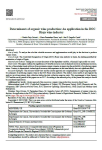
Article
Aim of study: To analyse the role that valuable resources and agglomeration would play in the decision to produce organic wines. Area of study: The Controlled Designation of Origin (DOC) Rioja wine industry in Spain, the leading qualified denomi[...]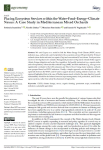
Article
We used Cyprus as a model to link the Water–Energy–Food–Climate (WEFC) nexus indicators (e.g., carbon and water footprints) to the ecosystem services (ES) provided by 39 mixed orchards (stone fruits and nuts) on organic (Org) and conventional (C[...]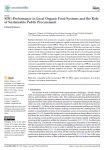
Article
Alternative food systems have occupied a steady niche in the food systems transformation discourse as one of the transformative pathways capable of addressing many of the United Nations Sustainable Development Goals (SDGs). Being one of the alte[...]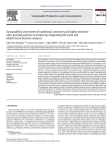
Article
Olive cultivation is the most important agro-ecosystem in the Mediterranean basin. Despite the remarkable intensification of this system (i.e., the use of high tree densities and large amounts of inputs), the environmental and socio-economic imp[...]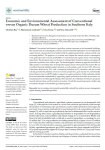
Article
C. Bux ; M. Lombardi ; E. Varese ; V. Amicarelli |Conventional and intensive agriculture systems represent an environmental challenge. This research aims at evaluating the economic and environmental implications of conventional and organic durum wheat production in Southern Italy by applying ma[...]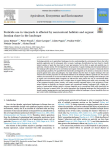
Article
L. Etienne ; P. Franck ; C. Lavigne ; J. Papaïx ; P. Tolle ; N. Ostandie ; A. Rusch |Reducing pesticide use in agricultural landscapes involves understanding the environmental drivers that affect pesticide application and its subsequent effect on pests. Landscape diversification has been found to benefit natural enemies of pests[...]
Article
Dans le contexte de profusion des signes de qualité qui caractérise le secteur agroalimentaire, l’originalité de ce papier est d’évaluer la disposition à payer des consommateurs (DAP) pour le label agriculture biologique (AB), selon que le produ[...]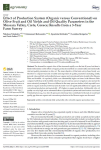
Article
The demand for organic olive oil has increased rapidly over the last 40 years, but there is limited information on the effects of organic production methods on commercially and nutritionally relevant quality parameters in olive oil. The main obj[...]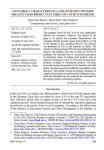
Article
Consumer’s characteristics and attitudes towards organic food products in times of Covid-19 pandemic
The pandemic caused by the Covid-19 virus significantly affected the consumers’ behavior. The subject of the paper is to analyze the consumer characteristics, the consumer attitudes towards organic food products, as well as the changes in the co[...]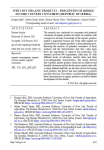
Article
The research was conducted on consumers and potential consumers of organic products in Serbia. In countries with average low incomes, knowledge of the organic products market is important because one of the often singled out characteristics of o[...]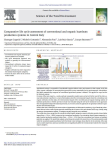
Article
G. Coppola ; M. Costantini ; A. Fusi ; L. Ruiz-Garcia ; J. Bacenetti |Agricultural activity is responsible of considerable negative effects on the environment. In this context, in the last years, organic cultivation is increasing being perceived as more sustainable for the environmental. Nevertheless, this higher [...]









